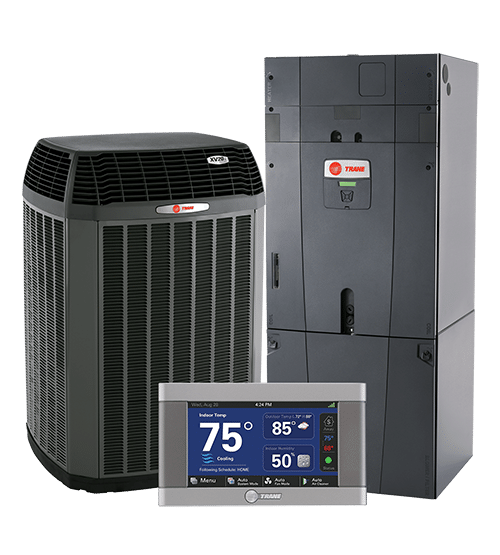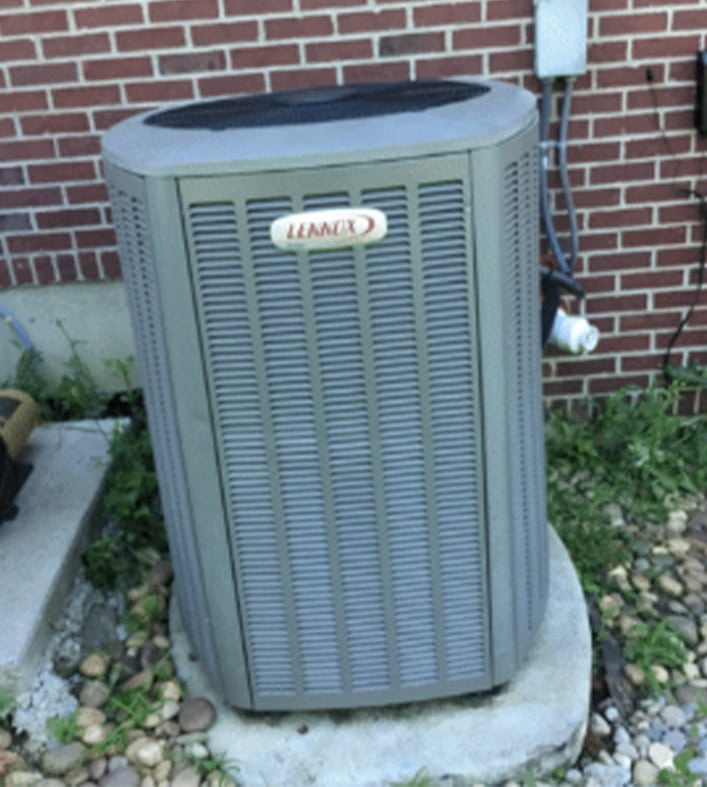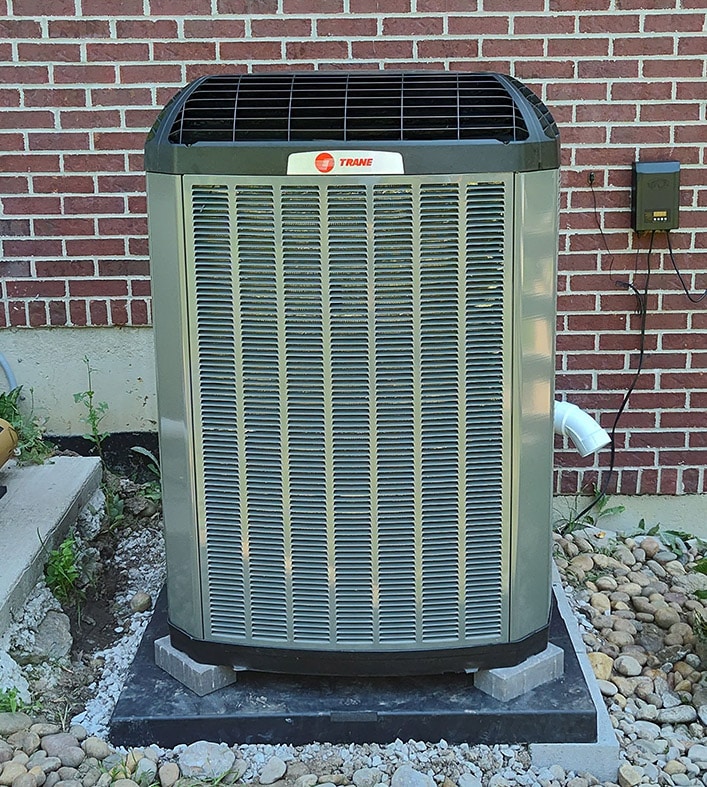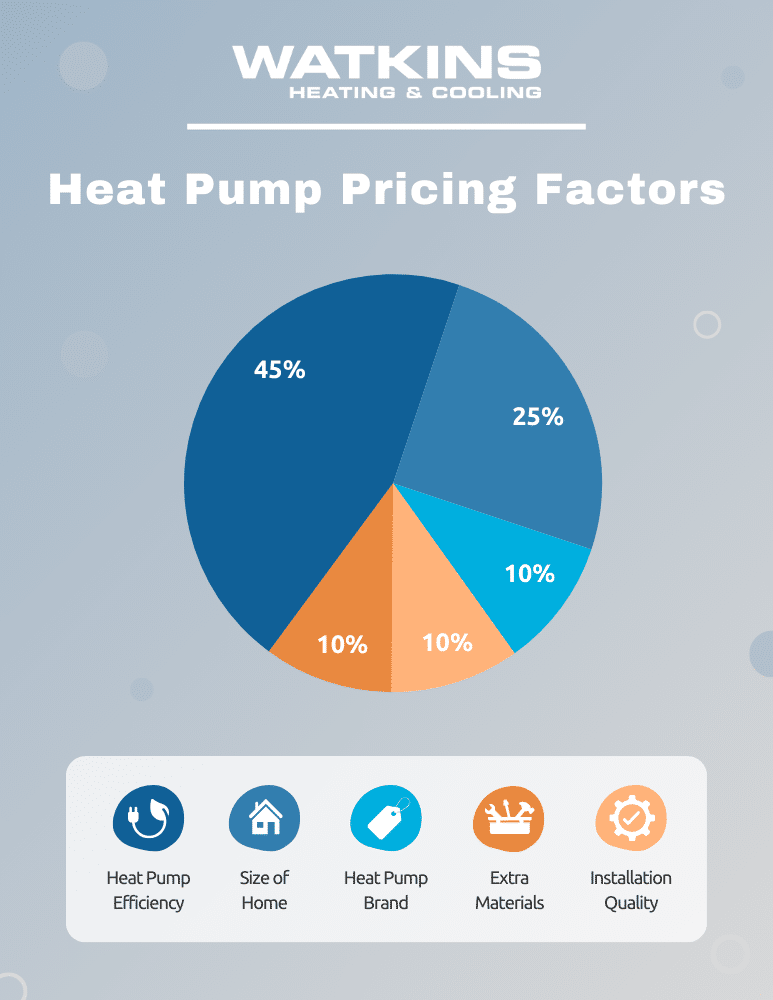Heat Pump Replacement Cost
Reliable Heat Pump Installation with Clear Pricing
Navigating the process of replacing your heat pump can be overwhelming – from understanding the latest technology jargon to sorting through various rebate programs and installation options. To complicate matters further, it’s almost impossible to find accurate pricing without enduring an in-home sales pitch. Our goal at Watkins Heating & Cooling is to create the most transparent HVAC website – helping you find answers to your questions so that you can make the best decision for your home and family. While we can’t provide an exact heat pump replacement cost without assessing your home, we can offer the closest online estimate you’re likely to find. Let’s walk together through the key cost factors and available options to help you budget for your heat pump installation.
Unlike most appliances, a heat pump or air conditioner can’t just be unboxed and plugged in. It must be properly sized to fit your home and paired with the right indoor unit to guarantee maximum performance and comfort. Key factors that determine a heat pump’s cost include the size of your home, the heat pump model you select, and the installation requirements unique to your home. While heat pump replacement costs can range from $8,200 to $21,000, the average investment for a new heat pump system within indoor air handler in Ohio is approximately $12,500. This includes heat pump, air handler, backup strip heaters, and installation.
We break down your options and offer a handy calculator to help you budget for your heat pump upgrade. The most common type of heat pump in Ohio is an air source heat pump paired with an indoor air handler (also known as an electric furnace or fan coil). The outdoor unit pumps refrigerant to the indoor unit, which heats or cools the air and distributes it through your home’s duct system. Homeowners often prefer air source heat pumps for their energy efficiency and versatility. Alternatively, you can pair the heat pump with a fossil fuel furnace (natural gas, propane, or oil) to create a hybrid system. For simplicity, this guide quotes the cost for the traditional air source heat pump – air handler combination.
Heat Pump Cost Calculator
(with Air Handler)
Our Heat Pump Cost Calculator breaks down the total dollar amount into four key components, giving you a personalized estimate for your Ohio home before speaking with our team.
This price includes the air handler, as a heat pump can’t function without the indoor coil. Unlike many contractors, we provide transparent estimates that include both components as well as installation.
Heat pump prices vary depending on factors like home size, energy efficiency, and installation complexity. With our calculator, you can adjust sliders to see how each factor affects your overall quote in real-time. Giving you a reliable ballpark figure based on your home’s unique setup.
For detailed pricing on specific Trane heat pump models, explore our products or schedule a free consultation with one of our experts for one-on-one heat pump installation costs.

How Much Does a New Heat Pump / Air Handler Cost?
At Watkins, we believe homeowners deserve clear HVAC info, like open heat pump pricing. Below are the prices we charge for a new pump, including the necessary air handler and installation. Others may advertise low prices but add on more later. We offer systems for every need and budget to ensure the right fit for you:
-
Entry-Level Models: $8,192 – $10,774
These heat pumps are perfect for budget-conscious individuals looking to save money on heating and cooling. They have reliable single-speed performance but no advanced features.
- Mid-Range Models: $11,527 – $15,182
This middle range of heat pumps offer an ideal balance of cost, efficiency and performance with two-stage compressors that provide better temperature control.
- Premium Models: $15,517– $20,886
These premium models provide superior performance, efficiency and comfort with variable-speed compressors and advanced humidity control.
Book a Heat Pump Install Estimate
Book A Consultation
Review Your Options
Professional Installation
Key Factors Affecting Heat Pump Cost
When considering a heat pump replacement, it’s important to understand the various factors that contribute to the overall cost. Our price transparency helps homeowners make informed decisions, so let’s break down the main factors that affect heat pump installation costs.
- Heat Pump Efficiency: The efficiency of your chosen heat pump significantly impacts the overall cost, contributing about 45% of the total. Highly efficient heat pumps may be more upfront, but they offer long-term benefits like lower energy costs, better temperature control, and enhanced comfort features.
- Size of Home: Home size affects about 25% of heat pump costs. Larger homes need bigger systems which means more materials like copper and aluminum. With our Right Size Guarantee and heat load analysis, we determine which size heat pump is perfect for you.
- Heat Pump Brand: When comparing similar heat pump models apples to apples, the cost difference is usually less than 10% between off-brands and top-tier brands like Trane. Trane also makes a “system for every home,” with a range of models from entry-level to state of the art.
- Extra Materials: Some installations are as easy as swapping out the heat pump and air handler. Others require new electric circuits, linesets, thermostat, or major duct changes. Typically, these extras change the price by about 10%.
- Installation Quality: It’s tough to put a price on quality heat pump installation. How much is saved by cutting corners? At Watkins, we hire the best craftsmen who focus on quality. We use techniques like purging dry nitrogen while brazing, responsibly recycling old refrigerant, and pulling deep vacuums. Installing a heat pump with these details and expertise ensures your system runs at peak efficiency for as long as possible.
Why Are Modern Heat Pumps So Expensive?
The price tag on a new heat pump system can be surprising to many homeowners. As HVAC professionals, we’re experiencing these rising costs firsthand, both in equipment and operational expenses. Let’s explore some of the key factors contributing to the current cost of heat pump installation.
Economic factors play a significant role. Inflation affects the entire supply chain, from raw materials like metals and refrigerants to manufacturing and installation costs. These price increases ripple through the industry, ultimately affecting the final cost to homeowners.
A skilled labor shortage in the HVAC industry is another crucial factor. With fewer people entering the trades, wages for qualified technicians have increased, directly impacting installation costs. This shortage also highlights the importance of choosing experienced professionals for your heat pump installation.
Government regulations and environmental standards have the largest impact on the cost of a new heat pump. Requirements for higher efficiency ratings, updated testing methods, and the transition to more environmentally friendly refrigerants all contribute to increased production and installation costs. While these changes benefit the environment and long-term energy consumption, they do affect upfront costs.
Technology advancements in heat pump systems have significantly improved their performance and efficiency. Modern units offer features like variable-speed operation, smart home integration, and improved humidity control. These enhancements provide superior comfort and energy savings but also contribute to higher initial costs. Systems like variable speed heat pumps offer more control and efficiency compared to older models.
When Should You Replace Your Heat Pump?
Determining when to replace your heat pump can be tricky because most issues are fixable. But there comes a point when the cost and hassle of frequent repairs outweigh the benefits of keeping the system. Your service technician may suggest a new HVAC system, but how can you know it’s the right choice?
Age is a key factor—most warranties last 10 years, and repairs after that can get expensive. Heat pumps typically last about 12 years, but with proper installation and maintenance heat pumps can run up to 15 or even 20 years. While minor repairs are common, major issues often arise around the 10-year mark, such as costly compressor or coil replacements. At that point, repair costs may not justify keeping the system, and the heat pump installation cost may be more worthwhile than continued repairs.
Replacing your heat pump proactively can save you stress, and a new system will likely improve comfort and deliver long-term energy savings. Many homeowners start evaluating heat pump costs and benefits when their system reaches this age. Here are other signs it might be time for a replacement:
- Recurring Repairs: Frequent breakdowns can “nickel and dime” you, costing more in the long run than just replacing the heat pump system.
- Rising Energy Bills: As heat pumps age, they lose efficiency and capacity. The 13 SEER heat pump you bought ten years ago might now be closer to 10 SEER.
- Reduced Performance: Older heat pumps also lose capacity. This results in reduced temperature and humidity control and poor comfort levels in your home.
- Aging System: If your heat pump system is older than 12 years, start planning for a replacement.
Making Your New Heat Pump Unit More Affordable
Financing Payment Plans
We provide financing plans specifically designed for heat pump installations. With low monthly payments and flexible terms, you can install a high-efficiency system without straining your budget. Choose from several payment options to find the plan that suits you best.
Watkins Discount Specials
Explore our limited-time discounts and promotions to save on your new heat pump installation. Current offers include rebates on high-efficiency models like $1,000 off a full Trane XV20i heat pump, designed to optimize both heating and cooling performance.
Tax Credits & Rebates
Upgrading to efficient heat pumps with high SEER2 (Seasonal Energy Efficiency Ratio) and HSPF2 (Heating Seasonal Performance Factor) also gives tax savings. We'll guide you through governments rebates to maximize tax credits and offset your heat pump installation cost.
Why Watkins Heat Pump Installation is Different
At Watkins Heating & Cooling, we know that the quality of your heat pump installation is just as important as the heat pump brand you choose. With more than 30 years of experience, we only employ technicians who are dedicated to doing the job right the first time. Our team is paid based on the quality of their work rather than how quickly they complete a job. This means they focus on a top-quality installation, giving every aspect of your new heat pump the time and attention it deserves.
Proper installation is essential to get the most lifespan and performance from any HVAC system. Our heat pump unit installation process begins with a detailed heat load calculation to ensure your heat pump is the perfect size for your home. After install, our technicians test performance and fine-tune airflow and refrigerant levels for optimal efficiency. When installing a heat pump, we make sure your system is optimized for the lowest possible energy costs.
Every home has unique heating and cooling needs, and every family has unique priorities, so our comfort consultants work with you to find a heat pump system that suits your home and budget. Maybe you’re considering replacement heat pump options or upgrading to a more energy efficient system. Maybe you’re looking ductless heat pump systems, variable capacity heat pumps, or more traditional air source heat pumps. No matter what, we have you covered. Our Watkins Heating and Cooling teams are highly trained in every heat pump type and our heat pump installation cost is clearly outlined.


A Watkins Real-Life Heat Pump Replacement Story
The Problem: A customer from Lebanon, Ohio, reached out to us during the peak summer heat. Her old Lennox 5-ton heat pump and Lennox natural gas furnace (90% efficiency) was beginning to give up. The system had struggled to keep her home warm the previous winter, and now it had stopped cooling altogether. After a failed repair attempt, she decided it was time to replace the system entirely. The family was dealing with sweltering temperatures and uncomfortable humidity levels, and indoor air quality had become a concern as well.
The Solution: We refunded her previous repair and walked the family through several replacement options. Ultimately, they decided to go with the best of the best: a Trane XV20i Heat Pump with 60,000 BTUs and an impressive 20.5 SEER2 cooling efficiency, 8.7 HSPF2 heating efficiency, and 10 EER2. She also paired this with a Trane XC95m Gas Furnace, boasting 97% AFUE efficiency, and a 4TXC Indoor Unit coil to ensure ultimate temperature control throughout Ohio’s hot summers and cold winters. To further enhance comfort, she added a Trane 850 Smart Thermostat and an Aprilaire MERV 10 Air Cleaner to improve air quality and reduce allergens in the home.
The Result: Our team installed the new Trane XV20i Heat Pump system along with the XC95 Gas Furnace, the Aprilaire air cleaner, and the Trane 850 Smart Thermostat. We also made improvements to the ductwork and installed a wireless temperature sensor.
Before rebates, the heat pump portion of the project was around $10,000. Thanks to an exclusive $1,000 Watkins promo discount and an additional $300 discount for a recent repair, they saved $1,300 upfront. In addition, the ultra-high efficiency system qualified them for a $2,000 federal tax rebate for the heat pump and a $600 rebate for the gas furnace, totaling $3,900 in savings. After all rebates and discounts, the full system cost came to $18,096, which included the Trane heat pump, gas furnace, indoor coil, air cleaner, and smart thermostat.
In our quality check weeks later, the customer's family reported a dramatic difference in their home’s comfort, with the heat pump providing perfectly even, consistent cooling and their indoor air quality and humidity at perfect levels.
